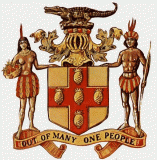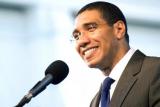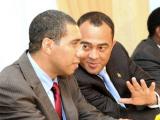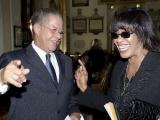Columns By Category
Popular Articles
- THE REALITY OF TACKY AND SAM SHARPE
- PLEASE DON’T BETRAY US AGAIN POLITICIANS
- CRY, MY MURDEROUS COUNTRY
- MODERNIZING THE PNP: VERSION.2020
- IS THE EXCHANGE RATE ON TARGET OR IS IT A WHOPPER?
- CARICOM: BEACON OF DEMOCRACY OR COWARDLY DISGRACE?
- DEMOCRACY PREVAILS IN THE UNITED STATES
- THE CRIME STATISTICS SPEAK FOR THEMSELVES
- PETROJAM, OIL PRICES, AND THE $7 TAX
- Kevin O'Brien Chang | Brains, not brutality – smart(phone) crime fighting
- TERRORISM IN JAMAICA
- STOP CURRENCY CRISIS TALK
- 'CASTIGATED KD' AND THE 9 YEAR WONDER
- GET PAST MERE TALK ON DONS AND GARRISONS
- LOW VOTER TURNOUT MYTHS AND ELECTION PREDICTIONS
- HOW GREAT CAN BROGAD BE?
- PNP WAS SOCIALIST FROM THE START
- AN AGE AND GENDER RE-ALIGNMENT ELECTION?
- Most influential Jamaican of 2010-2019?
- NO GAYLE, NO RUSSELL, NO TALLAWAHS
2011 Articles
CELEBRATING DEMOCRACY - JAMAICAN STYLE
- Article
- December 18, 2011
- No comments
First, some clarification is in order. In his December 11 Gleaner column, 'Duppy polls, obfuscation, ignorance and simpletons', Bill Johnson wrote, in reference to my December 4 Gleaner article titled 'Political polls and PM promises':
"Let me make it perfectly clear: the 2002 poll prominently cited by Chang in his column as mine was not conducted by me, if, in fact, it was conducted by anybody at all."
Political polls and PM promises
- Article
- December 4, 2011
- No comments
Bill Clinton allegedly remarked that "politics is about polls and focus groups", and it certainly worked for him. Mr Clinton's research-based ability to 'feel their pain' created a bond with the American people that even Monica Lewinsky never broke, and he remains the most popular president since Ronald Reagan.
Whether his Jamaican counterparts take such a scientific approach to politics, I can't say. One problem is that our pollsters are few, and have a mixed record. The Stone polls were extremely accurate for every general election between 1976 and 1997, but went astray in 2002.
Dreaming of a New Jamaica
- Article
- November 20, 2011
- No comments
All political lives, unless they are cut off in midstream at a happy juncture, end in failure, because that is the nature of politics and of human affairs. - Enoch Powell
Powell was probably right in a short-term sense. Democratic political careers are usually ended by death, illness, scandal-driven resignation, term limits, electoral defeat, or impending defeat. An elected leader voluntarily stepping down while basking in glory as voters beg him to stay is a vanishingly rare sight.
The Garrisons of Gordon House
- Article
- November 13, 2011
- No comments
"Both political parties have it within them to mutually agree to end the social construct of the garrison ... . Let us start the process by getting the leaders to walk together in these areas of exclusion ... . Hopefully, this small step will lead to other steps that will eventually remove garrisons from our political landscape." - Andrew Holness, October 23
Andrew Holness' potentially historic end-garrison-politics inauguration address has spurred much debate about what a garrison is, which constituencies are garrisons, and even if garrisons exist. Few have referenced probably the most significant document produced on the topic, namely, the 1997 Report of the National Committee on Political Tribalism, often called the Kerr Garrison Report.
A Chance for Transformation
- Article
- October 16, 2011
- No comments
In 10 days, Bruce Golding advanced Jamaican politics 10 years. He resigned as prime minister on September 25, then threw his weight behind the youngsters in his party, which led to 39-year-old Andrew Holness being proclaimed prime minister-designate on October 3.
Listening to the People
- Article
- October 2, 2011
- No comments
Democracy is about listening to the people, and Bruce Golding has listened to the people. For the last 18 months or so, the polls have shown that Jamaicans do not want him as prime minister. No doubt, at first, he hoped it was a temporary thing which time and hard work would change. But poll after poll showed the populace's sentiments had hardened, and the message remained the same - Bruce, you must go. And now he is doing so.
Views of a Non-Tribal Jamaican
- Article
- September 18, 2011
- No comments
A few months ago, a gentleman we shall call Lancelot Murray (not his real name) telephoned me. He said he heard me on TV and looked up my number in the phone book. He described himself as someone who loved politics and followed it closely.
We had a long talk, and then I said, "Your views are very interesting. Why don't you write down all you are telling me and have me run it as a column?" He agreed. Things take time, and this week he sent it to me. So me get it, so me give it.
Golding's Record in Perspective
- Article
- September 4, 2011
- No comments
'There are lies, damned lies and statistics,' goes one argument. 'It's easy to lie with statistics, but it's easier to lie without them,' says another. At any rate, numbers only mean anything when put in perspective, especially economic numbers.
Jamaica having 2.5 per cent inflation from January to June of this year, and our economy growing by 1.5 per cent in the first two quarters, doesn't really ring bells. But Jamaica having both lower inflation and higher GDP growth than the United States for the first half of 2011 makes you sit up and pay attention. When has this happened before, if ever? (Sources: BOJ, USBEA)
The Smallest World Cultural Power
- Article
- August 14, 2011
- No comments
When the black, green and gold went up on midnight August 5, 1962, this island was unknown and insignificant to most of the world, and even to those who lived here the word, 'Jamaica' evoked little emotion.
Forty-nine years on, we are famed planetwide for our vivid music and culture, and 'Jamaica' instantly induces a sense of spontaneous excitement and freedom of spirit.
Now world-influencing nations are usually old, big or rich.
Feeling Good about Jamaica
- Article
- August 7, 2011
- No comments
THE BBC'S Country Profiles mostly start with a dry economic or political summary. One of the few exceptions is Jamaica, which begins "Known for its strong sense of self-identity, expressed through its music, food and rich cultural mix, Jamaica's influence extends far beyond its shores."
There are bigger and richer and more historical countries than Jamaica. But how many of us would have wanted to be born elsewhere?







